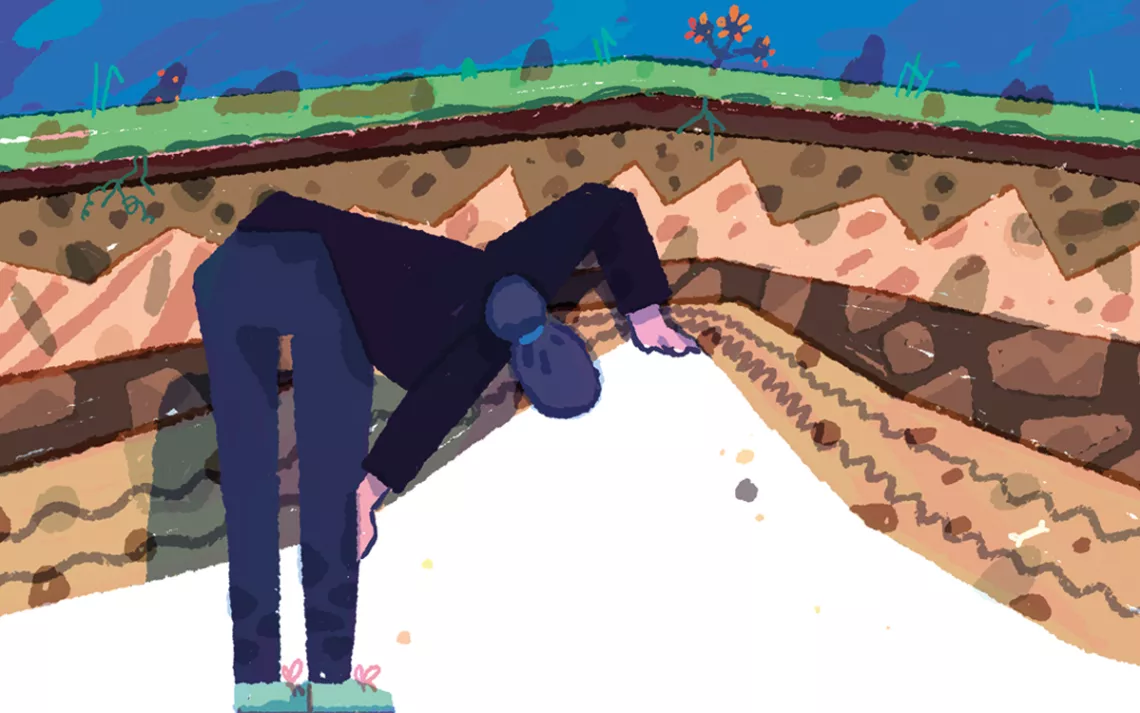To Fix Climate Change, We Need to Understand Time
Vonnegut was right: We need a "secretary of the future."

Illustration by Sam Rowe
As a geologist and a professor, I speak and write rather cavalierly about eons. One of the courses I teach is The History of Earth and Life. It’s a survey of the 4.5-billion-year saga of the entire planet—in a 10-week trimester. But as a human—and more specifically, as a daughter, mother, and widow—I struggle like everyone else to look time honestly in the face.
Most humans have no sense of temporal proportion—the durations of the great chapters in Earth’s history, the rates of change during previous intervals of environmental instability, the intrinsic timescales of “natural capital” like groundwater systems. As a species, we have a childlike disinterest in the time before our appearance on Earth. This ignorance of planetary history undermines any claims we may make to modernity. We are navigating recklessly toward our future using conceptions of time that are as primitive as a world map from the 14th century.
In these dark times, it is empowering (or at least therapeutic) to imagine what a time-literate society might look like. In his last public interview, Kurt Vonnegut said, “I’ll tell you . . . one thing that no cabinet has ever had is a ‘secretary of the future,’ and there are no plans at all for my grandchildren and my great-grandchildren.” Let’s adopt Vonnegut’s suggestion as our first proposal: a representative for the yet-to-be-born.
The Department of the Future would set in motion a realignment of priorities. Resource conservation would be a patriotic virtue. Tax incentives would be rebalanced to reward long-term stewardship over short-term exploitation. Putting a price on carbon might help us prepare for natural disasters that will happen without our assistance—like the hundreds of large earthquakes that will occur in the next century—without needing to expend resources on self-created climate catastrophes.
Poverty would be recognized as a problem with deep historical roots that cannot be solved without sustained commitment. Public school teachers and others whose work represents an investment in the future would be paid well and held in high esteem. Schools would help develop children’s knowledge of history and natural history. With a solid understanding of how the planet works, students would go on to hold public officials accountable for the governance of water, land, and air.
In many ways, geology is about understanding how the secret stories of the past hold up the world, envelop us in the present, and set our path into the future. The past is not lost; it is palpably present in rocks, landscapes, groundwater, glaciers, and ecosystems. For me, geology points to a middle way between narcissistic pride in our importance and existential despair at our insignificance. It affirms a teaching attributed to the 18th-century Polish rabbi Simcha Bunim, that we should all carry two slips of paper in our pockets: one that says “I am ashes and dust” and one that reads “The world was made for me.”
A noteworthy psychological study suggests that resistance to the concept of evolution is rooted more in existential dread than in religious doctrine, and that it declines as people become more familiar with stories from the natural world. As Darwin wrote so lyrically in the closing lines of On the Origin of Species:
There is grandeur in this view of life, with its several powers, having been originally breathed into a few forms or into one; and that, whilst this planet has gone cycling on according to the fixed law of gravity, from so simple a beginning endless forms most beautiful and most wonderful have been, and are being, evolved.
That grandeur has always included us; we have simply tormented ourselves with the idea that we are outside the garden.
This article appeared in the January/February 2019 edition with the headline "Thinking Like a Mountain."
 The Magazine of The Sierra Club
The Magazine of The Sierra Club



